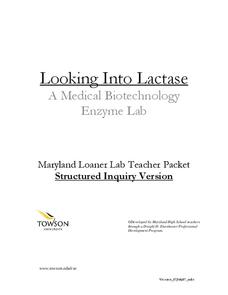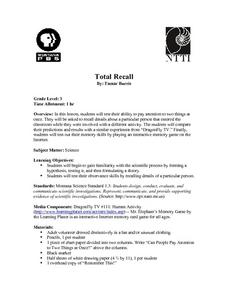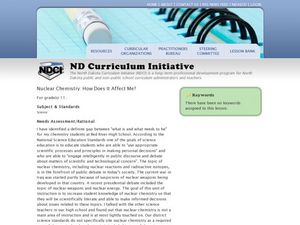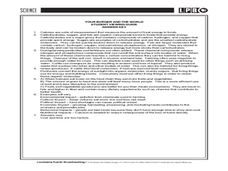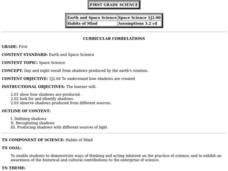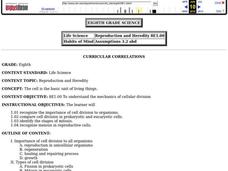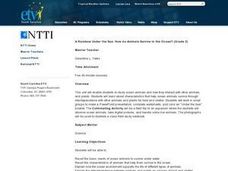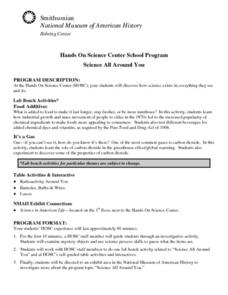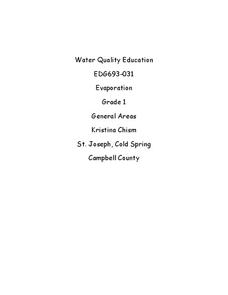NASA
Space-Based Astronomy on the Internet
Young scientists compile everything they have learned into a report in the fifth and final lesson in a unit on the visible light spectrum. Access to photos from observatories, telescopes, and satellites allows learners to compare and...
Polar Trec
Arctic Smorgasbord!
Two blooms of phytoplankton, instead of just one, now occur in the Arctic due to declining sea ice, which will have widespread effects on the marine life and climate. In small groups, participants build an Arctic food web with given...
International Technology Education Association
Become a Weather Wizard
Accurate weather forecasting is something we take for granted today, making it easy to forget how complex it can be to predict the weather. Learn more about the terms and symbols used to forecast the weather with an earth science lesson...
Towson University
Looking Into Lactase: Structured Inquiry
Why is lactase important? Biology scholars explore enzyme function in a structured inquiry lab. The activity tasks lab groups with observing how temperature and pH affect enzyme activity, as well as determining which milk products...
Curated OER
Tracking Current "Earth" Events
Eighth graders utilize Internet research skills, and practice their communication skills by presenting their research to the clas. They actively consider the types of hazards for humans associated with Natural Disaters and ways that...
Curated OER
Science: Total Recall
Third graders attempt to recall details about a person entering the classroom while they are involved in another activity. They test their skills of observation and memories by playing an interactive memory game.
Curated OER
Hunger/ Nutrition
Seventh graders investigate nutrients and nutrition to determine what types of food the body needs for energy. They study each type of nutrient and why it is important to the body. They determine what a balanced diet is by completing the...
Curated OER
Nuclear Chemistry: How Does It Affect Me?
Eleventh graders study the different areas of nuclear chemistry. In this energy and critical thinking instructional activity students study radiation, nuclear energy and weapons then divide into groups and create a poster.
Curated OER
Science: Handwritten Personality
Students watch an episode of "Frontiers" and discover the scientific basis for handwriting analysis. In the video, they discover how size, shape, and slant of handwriting suggest personality traits. After a discussion, students offer...
Curated OER
Fast Food: You Can Choose!
Learners research the nutritional value of fast food. They assess which fast foods are best and worst to eat. They organize their data into tables and graphs and explain their findings to other students.
Curated OER
Response to Stimuli
Students study the process of detection, coordination and response. In this biology lesson, students design an experiment to test stimuli response. They participate in a game-show style quiz after the activity.
Curated OER
Let’s Make Cottage Cheese
Students watch the process of making cottage cheese from milk, then season and taste the product. In this making cottage cheese lesson, students make a connection between what they eat and where it came from. Students view the...
Curated OER
Meteorology
Fourth graders study how atmospheric conditions change while naming the things that make the weather change. They investigate the affects of air masses, weather fronts and high/low pressure by looking at weather maps from newspapers.
Curated OER
Day and Night
First graders study that day and night result from shadows produced by Earth's rotation. Students work to show how shadows are produced, look for and identify shadows and observe shadows produced from different sources.
Curated OER
Salty Sea Water
Young scholars conduct an experiment to find out if there is salt in the ocean. In this scientific inquiry lesson, students pour a cup of salt water onto an aluminum plate and observe the changes over a few days. Young scholars complete...
Curated OER
Reproduction and Heredity
Eighth graders study the importance of cell division, compare cell division in prokaryotic and eucaryotic cells, identify the stages of mitosis and recognize meiosis in reproductive cells.
Curated OER
Gold Mine
Students investigate gold. In this gold panning lesson, students demonstrate the process of mining through an experiment using two boxes of sand. Students design a safe way to mine gold.
Curated OER
A Rainbow Under the Sea: How do Animals Survive in the Ocean?
Second graders read books, watch videos, complete worksheets and participate in class discussions about ocean animals. They, in groups, design PowerPoint presentations on selected marine animals.
Curated OER
Science All Around You
Students visit and explore a Hands On Science Center (HOSC). They participate in a variety of self-guided table exercises and observe as scientists demonstrate various scientific principles.
Curated OER
Evaporation
First graders explore, analyze, document and study weather and the water cycle. They observe the weather and begin a weather journal. Each student interacts with the concepts of evaporation, condensation and precipitation, clouds,...
Curated OER
Matter Unit
Students create products from studying about matter that include: Make a "T" chart with matter and non matter items. Write a poem, song, or rap about matter. Five vocabulary words from the chapter must be included in the poem.
Curated OER
Backyard Critters
Young scholars explore the characteristics of invertebrates in their backyards. They observe, describe, and classify specimens. They conclude with a "snail race."
Curated OER
Classification
Students explore the observable properties of matter and utilize them in classification. They use a binary classification system to divide objects, then justify their scheme.
Curated OER
Emulsion_ Compulsion
Middle schoolers experiment with common household products to determine the properties of emulsions and how they fit into the classifications of matter through this series of lessons.





